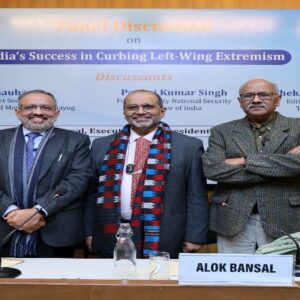~ By Rajat Sethi & Shubhrastha
Poll Managers’ meet, jointly hosted by the International Democrat Union (IDU) and UK Conservative Party, recently concluded in London from 30th May to 1st June, 2016. IDU had invited the BJP among the other 15 member political parties to discuss the latest trends in election management and sharing best practices for campaign efforts. The meeting was held at the Campaign Headquarters of the Conservative Party.
The meeting was held in the backdrop of UK’s national referendum on Britain’s future with European Union. Both the ‘Remain’ and ‘Brexit’ campaigns have so far been apolitical, however the Conservative led national government has officially sided with Remain.
The meeting predominantly focused on election campaign strategies being deployed by the participating center-right parties. Representatives from these parties shared their ideas and presentations on the recent elections held in their nations and also talked at length about strategies that have been game changers in impacting electoral processes.
Data analytics and teasing out strategies from what data communicates seem to have been the latest established success norm with most of the recent elections. In the words of Klaus Schueler, Chairman of Campaign Managers’ Committee of IDU, “Understanding data signals are key to devising strategies for elections. Data never lies and therefore one must absolutely trust data for comprehending a political situation.”
Schueler went on to demonstrate how voting patterns and voting behavior were studied in detail via surveys and feedback forms before any strategic input was considered for elections by CDU, a center-right political party in Germany. Elaborating on the role of data, Alex Skatell, American entrepreneur and political advisor to the Republican Party shared, “Data-centric insights help devise communication strategies and campaigns that are more robust and measurable. The scope of making mistakes in communication strategy lessens and room for course correction increases manifold.”
While talking about Research and Data Challenges, Chris Scott, Director of Voter Communication for UK Conservative Party, noted, “One of the reasons why the Conservative party has an edge over its opponents is the way in which we have access to every household and voter. Our data sets are neatly arranged and quite comprehensive. With such a huge organized bulk on our plate, we are able to run macro- and micro-campaigns according to the need of the campaign cycle. However, what is to be said and most importantly what not to say are core questions for any elections.”
While it is true that data plays a very important role in elections, it is also important to note that data alone can only supplement the campaign efforts. The key to a finely run campaign is messaging. What a party conveys to its voters and how it conveys it is of utmost importance to affect electoral outcomes. The selection of political messages is not an ad hoc exercise and should therefore be done through representative focus groups and ‘persuasion data models’.
Talking about the need to convey key messages to electorates, Greg Hamilton, Chief Executive of the New Zealand National Party averred, “Focused and consistent message is essential to the success of any campaign. We must learn to zone down our message concerns to maximum three ideas. It is important to limit the scope of communication to a few ideas rather than dabbling in multiple voices. At the end of the day, when the voter goes to the polling station, he/she is going to remember just two or three messages you convey.”
Elaborating further on the need for de-clutter in communication, Dag Terje Solvang, Campaign Manager for Conservative Party in Norway emphasized, “Even in visual communication, one must focus on just two or three primary shots or photographs that stick to a voter’s mind. The more we inundate our screens with visuals, the more cluttered and scattered our communication is going to be.”
Besides, the strategies behind ‘how to communicate’, the Campaign Managers’ Meet also stressed on the ‘what to communicate’ question. Christian Scheucher, Founding and Managing Director of Christian Scheucher Consulting in Austria remarked, “It is high time we address matters as they are. Since we know from data insights what it is that voters concern with the most and what issues they strongly feel about, there is no reason why one must beat around the bush to address key concerns. Call black as black and white as white. Sometimes, often being on the conservative side of politics, we leave major issues addressed at the risk of being politically incorrect. But, one must understand, that the world is suffering from huge politically incorrect acts and these need to be talked about.”
The delegation from Brazil and Bulgaria spoke about the challenges and issues concerning their democracies and expressed the need for more organized campaigns. Delegates from Ghana, Hungary, Australia, and Sri Lanka also represented the conservative parties from their respective nations.
As representatives from BJP, the authors shared their experiences from the recently concluded Assam Assembly Elections. They highlighted the problem of illegal migrantion from Bangladesh and how this issue became the key electoral plank for the elections.
International Democrats Union is an international alliance of center-right political parties created as a forum for policy and organizational discussions to further center-right ideologies across the globe. Currently, IDU is a working association of over 80 political parties across the globe. BJP joined the IDU earlier this year on February 25th, 2016.
* The authors worked on the BJP campaign for recent Assam elections.




